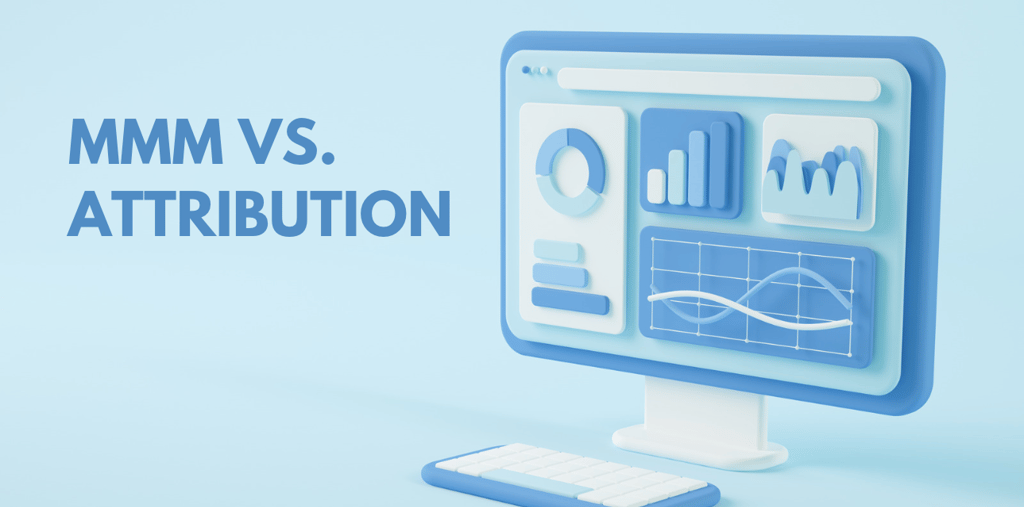Marketing Mix Modeling (MMM) vs. Attribution - Choosing the Right Approach for Your Business
MARKETING EFFECTIVENESS


When I first started in marketing, the creative aspects were my main focus. However, as I delved deeper, I realized that data and marketing analytics offered a whole new world to explore! Working with Objective Platform has given me the chance to dive headfirst into this fascinating area, an opportunity to explore different methods of measuring marketing effectiveness, and two popular approaches caught my attention: Marketing Mix Modeling (MMM) and Attribution.
The Potential of MMM - Marketing Mix Modeling:
Using a top-down perspective, Marketing Mix Modeling (MMM) helps you grasp the influence your marketing activities have on vital business factors like revenue, sales, and key performance indicators. It delves into past data and leverages statistical methods to evaluate the efficiency of multiple marketing channels and techniques, including TV commercials, print, and social media platforms.
A major advantage of MMM is its capacity to consider various external and internal factors that can impact the success of your marketing efforts. By incorporating aspects such as seasonal changes, economic trends, and competitor actions, MMM provides a comprehensive view of the entire marketing environment. Armed with this knowledge, you can allocate resources more effectively and make data-backed decisions to improve your results.
MMM allows companies to identify the best marketing combination to reach their specific goals, empowering them to distribute their marketing budget wisely across different channels and approaches. With these insights, marketers can make well-informed choices, refine their marketing endeavors, and enhance their return on investment.
In addition, MMM is useful for scenario planning and forecasting. It enables businesses to anticipate how potential shifts in marketing strategies or budget allocation might impact their overall performance. This forward-thinking approach allows marketers to proactively and flexibly adjust to evolving market conditions, ensuring that their marketing campaigns continue to generate positive outcomes.
Pros of MMM:
Offers a comprehensive view of marketing efforts
Ideal for businesses with extended sales cycles and multiple touchpoints
Helps recognize trends and external factors influencing performance
Cons of MMM:
Relies on historical data, which may not always mirror current market conditions
Less accurate than Attribution in tracking individual customer journey
To start with MMM, you'll need to collect historical data on your marketing endeavors, sales, and external factors. Then, using statistical techniques like regression analysis, you'll construct a model that identifies the correlation between marketing investments and your desired results.
Understanding Attribution:
Attribution adopts a bottom-up perspective, concentrating on the unique paths taken by individual customers and tracking the specific marketing touchpoints responsible for conversions. The goal here is to pinpoint which marketing channels and strategies excel at driving conversions, giving you the power to fine-tune your campaigns and make the most of your budget.
Attribution analysis allows businesses to gain a more granular understanding of how customers interact with various marketing initiatives across their purchase journey. By examining these interactions, you can identify the precise moments and channels that contribute the most to the desired outcomes, such as sales or sign-ups.
Furthermore, Attribution helps marketers tailor their messaging and offers to suit the preferences and behaviors of their target audience. By analyzing individual customer journeys, businesses can gain insights into what resonates with their audience and how to effectively engage them at various touchpoints.
However, it's worth noting that the reliability of Attribution has been called into question due to changes in data privacy regulations and the impending demise of third-party cookies. The changing landscape, with its focus on data privacy and the phasing out of third-party cookies, has made it increasingly difficult to precisely follow individual customer journeys. This shift may hamper the effectiveness of the Attribution method. Consequently, marketers might want to consider alternative strategies like MMM to maintain their ability to make well-informed choices rooted in dependable data.
Pros of Attribution:
Delivers granular insights into customer journeys
Enables precise optimization of marketing channels and tactics
Can be tailored to suit your business needs and objectives
Cons of Attribution:
Will be impacted by data privacy and cookie issues
May not account for the broader context of marketing efforts
To establish an Attribution model, you'll need to track customer interactions with your marketing touchpoints, like ads, emails, and social media posts. Then, using an Attribution model, you'll allocate credit to each touchpoint based on its contribution to the customer's decision to convert.
Is Marketing Mix Modeling or Attribution the Best Choice for Your Business?
Choosing between MMM and Attribution depends on your business necessities and priorities. If you seek a broad perspective of your marketing efforts and want to comprehend how different channels contribute to your overall success, MMM might be the ideal choice.
Alternatively, if you're more intrigued by the specifics of individual customer journeys and optimizing your marketing efforts at a micro-level, Attribution could be your path. However, bear in mind the data privacy and cookies issue, which may limit the effectiveness of Attribution in the future.
In the end, the optimal approach for your business depends on your distinctive needs, goals, and priorities. You might even discover that blending elements of both MMM and Attribution works best for you. The crucial aspect is to remain adaptable, continue learning, and remember that the marketing world is constantly evolving. So, happy measuring, and may the data be ever in your favor!
